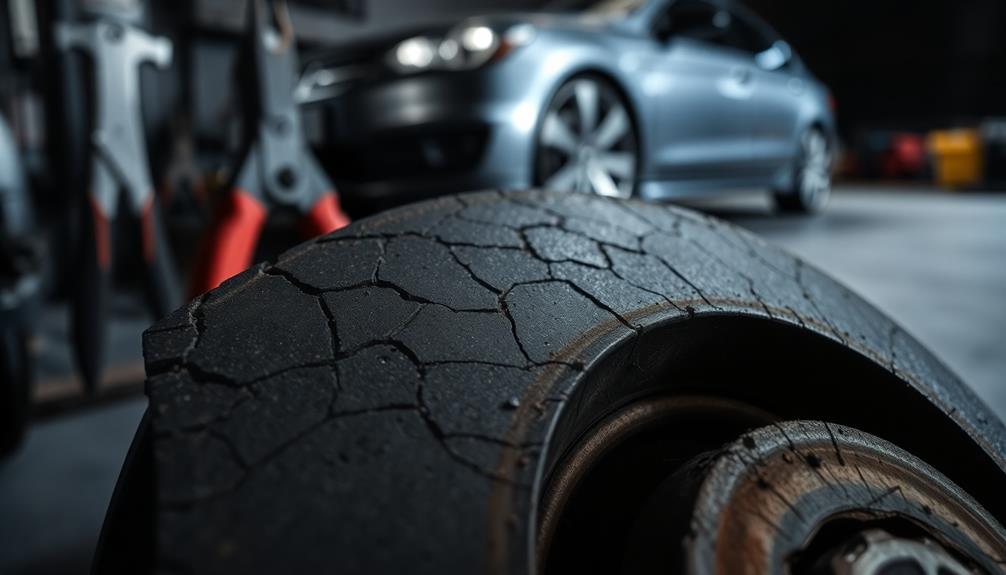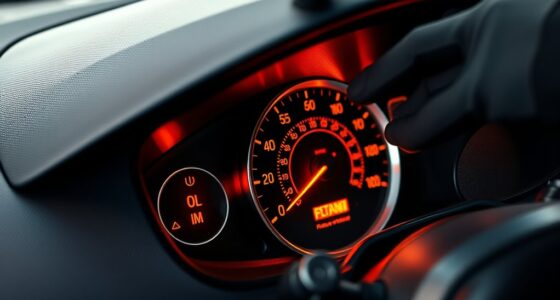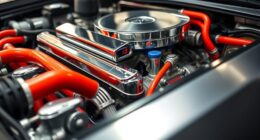Mechanics are urging you to avoid cheap brake pads, and it's a shocking safety risk. These low-quality pads can lead to compromised stopping power, increasing your chances of accidents. When you choose subpar options, you open the door to brake failures that could cost you thousands in repairs and threaten your safety. The initial savings just aren't worth it. Investing in high-quality parts not only guarantees reliability but also helps maintain your vehicle's performance over time. Stick around, and you'll discover why quality components are essential for your car's long-term health.
Key Takeaways
- Mechanics warn that low-quality brake pads can significantly compromise stopping power, increasing accident risks and repair costs.
- Cheap spark plugs may lead to engine misfires, resulting in costly repairs ranging from $1,000 to $3,000.
- Subpar tires raise the likelihood of blowouts and accidents, potentially incurring $10,000+ in related expenses.
- Ignoring maintenance and opting for low-quality parts can escalate minor issues into catastrophic failures, endangering safety.
- Investing in high-quality components ensures optimal performance and lifespan, ultimately reducing long-term maintenance costs.
Common Car Part Issues
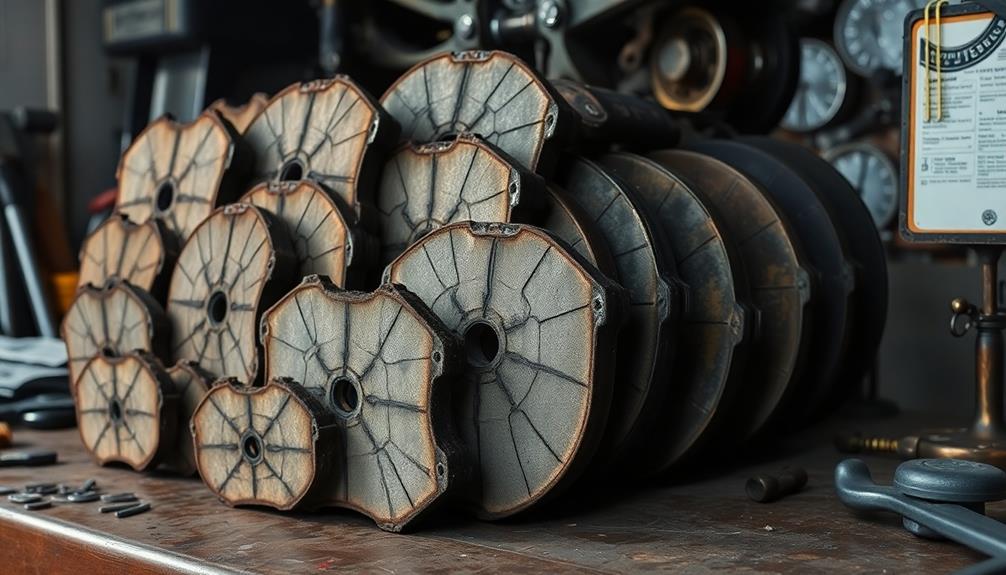
When it comes to keeping your car running smoothly, being aware of common car part issues can save you time and money. One major concern is spark plugs; mechanics warn that cheap aftermarket options can lead to engine misfires and reduced performance.
Don't ignore your brake pads, either. Worn pads often produce squeaking noises and can compromise your braking efficiency, leading to potentially costly repairs if you delay replacing them.
Fuel injectors also deserve your attention. Faulty injectors can severely impact your engine's performance and fuel efficiency, making regular maintenance essential to avoid expensive fixes later on.
Mechanics' Warnings on Quality
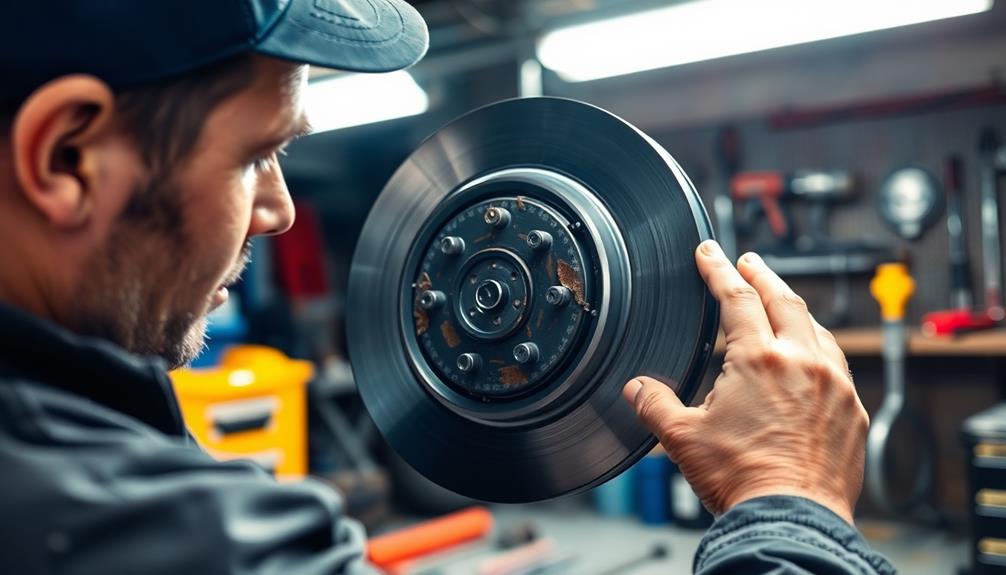
Many mechanics stress the importance of choosing high-quality car parts to assure your vehicle's safety and performance. When you opt for low-quality aftermarket parts, you risk facing serious consequences. Substandard brake pads can notably reduce your stopping power, increasing the chance of accidents. Similarly, cheap battery replacements may lead to frequent breakdowns, causing you more inconvenience and costs in the long run.
Investing in OEM (Original Equipment Manufacturer) parts assures compatibility and reliability, unlike generic alternatives. Using inferior spark plugs can trigger engine misfires, potentially resulting in severe engine damage if not addressed quickly.
Here's a quick comparison:
| Part Type | Consequence of Low Quality | Recommended Option |
|---|---|---|
| Brake Pads | Reduced stopping power | OEM Brake Pads |
| Battery | Frequent breakdowns | OEM Battery |
| Spark Plugs | Engine misfires | Quality Spark Plugs |
Choosing high-quality parts isn't just about performance; it's also about your safety and the longevity of your vehicle. Don't compromise—invest wisely.
Risks of Cheap Alternatives
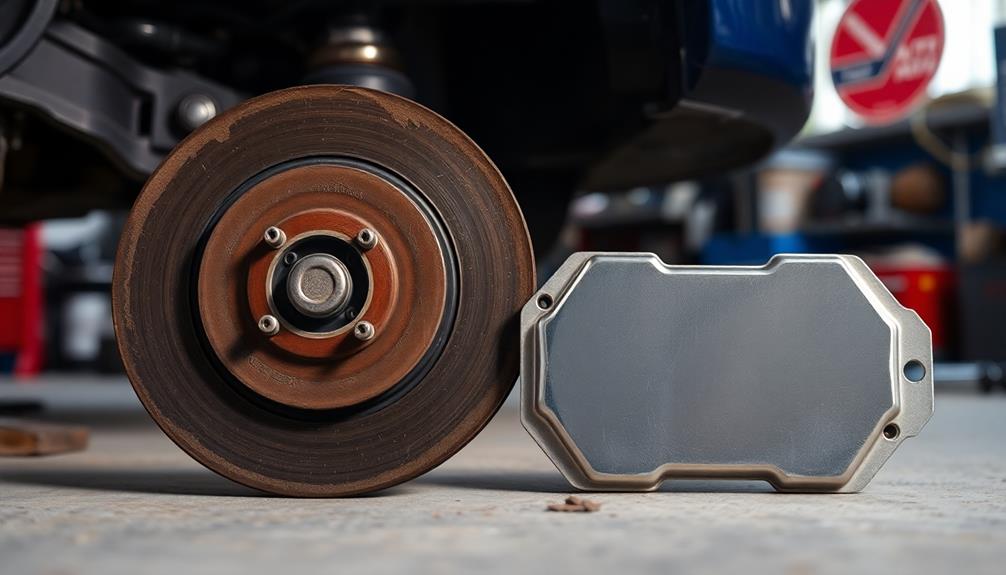
When you're tempted by cheap car parts, remember that saving a few bucks now can lead to serious safety and performance risks later.
Low-cost options often compromise quality, resulting in frequent replacements and higher long-term expenses.
It's essential to weigh the immediate savings against the potential for costly repairs and safety hazards down the road.
Quality Versus Price Comparison
Choosing cheap car parts might seem like a smart way to save money, but it often leads to costly consequences. While it's tempting to go for lower-priced options, these cheap car parts frequently compromise quality, resulting in higher failure rates and significant vehicle issues. This is especially true for components like brake pads, where understanding the importance of investment in quality can prevent safety hazards.
A study found that inferior brake pads can reduce braking efficiency, creating serious safety risks for you and your passengers.
Moreover, mechanics often report that customers opting for budget parts return with more frequent problems. This not only incurs additional repair costs but also leads to frustrating vehicle downtime.
Quality parts typically undergo rigorous testing and adhere to safety standards, ensuring reliability and performance that cheap alternatives simply can't match.
In the long run, investing in high-quality components might cost more upfront, but it can extend your vehicle's lifespan and prevent expensive repairs down the road.
Long-Term Cost Implications
Cutting corners on car parts can lead to significant long-term costs that far outweigh any initial savings. You might be tempted by the low price of cheap coolant or low-quality brake pads, but these choices can spell disaster down the road.
| Cheap Alternatives | Potential Long-Term Costs |
|---|---|
| Cheap Coolant | $2,500 – $4,000 (engine repairs) |
| Low-Quality Brake Pads | $1,000+ (brake system repairs) |
| Subpar Tires | $10,000+ (accident-related expenses) |
| Inferior Spark Plugs | Thousands (engine damage) |
For instance, using subpar tires increases your risk of blowouts, leading to accidents and hefty medical bills. Opting for inferior spark plugs can result in engine misfiring, potentially causing severe damage that costs thousands in repairs if not caught early. Meanwhile, low-quality brake pads may wear out quickly, increasing stopping distances and leading to costly repairs.
In the end, saving a few dollars now could lead to major financial headaches later. Investing in quality parts protects your wallet and your safety.
Safety and Performance Risks
Opting for cheap alternatives in car parts can seriously jeopardize your safety and vehicle performance. While you might save a few bucks initially, the risks associated with low-quality parts can lead to dangerous situations on the road.
Consider these potential dangers:
- Brake Pads: Cheap pads can increase stopping distances and may even lead to brake failure, putting you and others at risk.
- Tires: Substandard tires reduce traction and handling, especially in bad weather, considerably heightening your chances of an accident.
- Engine Oil: Using low-quality oil can fail to lubricate properly, leading to increased engine wear and potential catastrophic failures that could leave you stranded.
These risks highlight why investing in quality car parts is vital for both safety and performance. You might think you're saving money, but those savings can quickly disappear if you face costly repairs or accidents due to inadequate parts.
Long-Term Consequences of Savings
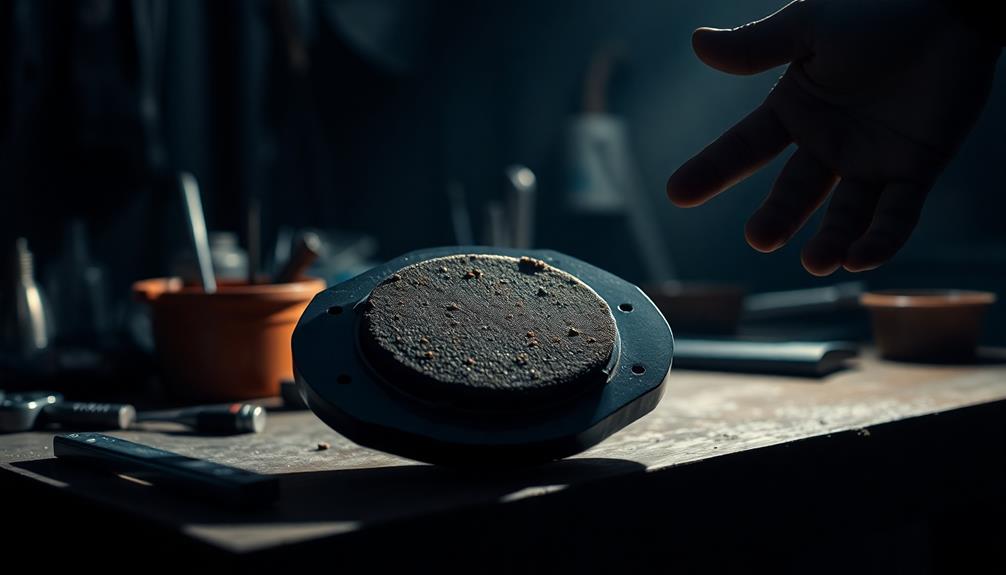
When you choose cheap aftermarket parts, you might save a few bucks now, but the long-term costs can add up quickly.
These savings can be misleading, as opting for lower-quality components often leads to increased maintenance needs and unexpected failures. You'll likely face costly repairs down the road, and your vehicle's safety could be at risk if those parts fail.
Ignoring quality can also lead to maintenance neglect, making it harder to keep your car running smoothly.
For businesses, prioritizing high-quality parts can enhance reliability and improve cash flow management with quicker transactions, especially when dealing with merchant account credit processing.
Costly Repair Implications
Neglecting regular maintenance on your car might seem like a way to save money in the short term, but it can lead to costly repairs down the line.
Just like how air purifiers can drastically improve indoor air quality, taking care of your vehicle can prevent significant health and financial issues. By skipping out on essential check-ups, you expose yourself to severe auto repair implications that can drain your wallet.
Consider what could happen if you ignore these issues:
- Engine Damage: Failing to replace worn spark plugs can lead to misfires, racking up repair bills ranging from $1,000 to $3,000.
- Neglecting Tire Maintenance: This can result in blowouts, leading to accidents and additional costs for towing and repairs.
- Fluid Checks: Overheating due to neglected coolant levels can cause catastrophic engine failures, with replacement costs averaging between $2,500 and $4,000.
Each of these oversights can escalate quickly, turning minor issues into significant expenses.
It's tempting to skip maintenance to save a few bucks now, but the reality is that such decisions can snowball into costly repair implications that could have easily been avoided.
Prioritize your vehicle's health to keep your finances in check.
Safety Risks Involved
Safety should always be your top priority on the road, yet cutting corners on car maintenance can lead to dire consequences. Ignoring the replacement of worn brake pads, for instance, can result in brake failure, greatly increasing your risk of accidents. It's not just your safety at stake; it can impact others on the road, too.
If you drive on compromised tires with low tread depth or visible damage, you're risking blowouts and loss of control. That could lead to severe crashes, putting everyone in danger.
Neglecting routine checks on vital fluid levels, like engine oil and coolant, can cause engine overheating or seizure, leading to expensive repairs. To avoid such costly issues, it’s essential to make fluid checks a regular practice. An effective engine damage prevention DIY hack is to check your engine’s oil and coolant levels every two weeks, especially before long trips. Keeping a small bottle of coolant and engine oil in your vehicle can help you quickly top off fluids if levels are low, potentially saving you from roadside breakdowns and costly repairs down the line.
Moreover, failing to address warnings like the Check Engine Light can let minor issues spiral into major engine problems, often costing more than proactive maintenance would have.
Skipping regular checks, including battery health assessments, can leave you stranded, incurring unexpected towing and repair expenses. You might save money in the short term, but the long-term safety risks are simply not worth it.
Prioritize your vehicle's maintenance to keep yourself and others safe on the road.
Maintenance Neglect Consequences
Ignoring regular maintenance can have significant long-term consequences that far outweigh any short-term savings. When you neglect your car's upkeep, you're not just risking your wallet; you're also endangering your safety.
Consider these potential outcomes:
- Increased repair costs: Minor issues can quickly escalate, leading to expensive fixes that could have been prevented.
- Worn-out tires: Failing to replace or rotate them can halve their lifespan, raising the likelihood of blowouts and accidents.
- Fuel efficiency drop: Poor maintenance can decrease efficiency by up to 45%, costing you more at the pump and harming the environment.
Maintenance neglect leads to severe safety hazards, including the possibility of a complete system failure while driving.
It's alarming to think that nearly 800,000 roadside assistance calls in Salt Lake City alone stem from these avoidable issues.
By investing a little time and effort into regular maintenance, you can save up to 30% on repair costs over time and guarantee your vehicle remains safe and efficient.
Don't let short-term savings compromise your safety; prioritize your car's health for a smoother ride ahead.
Importance of High-Quality Parts
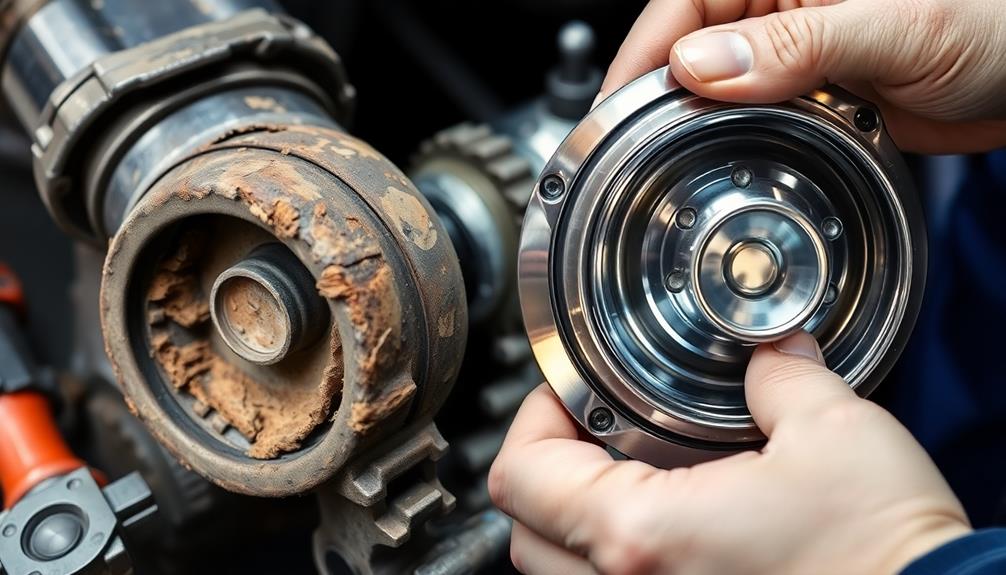
High-quality car parts are essential for maintaining your vehicle's performance and longevity. When you invest in premium components, you're not just enhancing your ride; you're also safeguarding your wallet from future expenses. Inferior parts can lead to frequent breakdowns and costly repairs, especially in critical areas like brakes and suspension.
Here's a quick look at the benefits of high-quality parts:
| Benefit | Description | Impact |
|---|---|---|
| Enhanced Vehicle Performance | Optimized for your car's specific needs | Smoother rides, better handling |
| Better Reliability Ratings | Often backed by extensive testing and warranties | Fewer breakdowns, lower maintenance costs |
| Increased Safety | Critical systems function as intended | Peace of mind on the road |
Choosing high-quality parts can greatly reduce maintenance costs and extend your vehicle's lifespan. Mechanics recommend these components because they offer improved performance and compatibility, ensuring your vehicle operates safely and efficiently. So, when it comes to parts, remember: quality matters.
Tips for Choosing Components
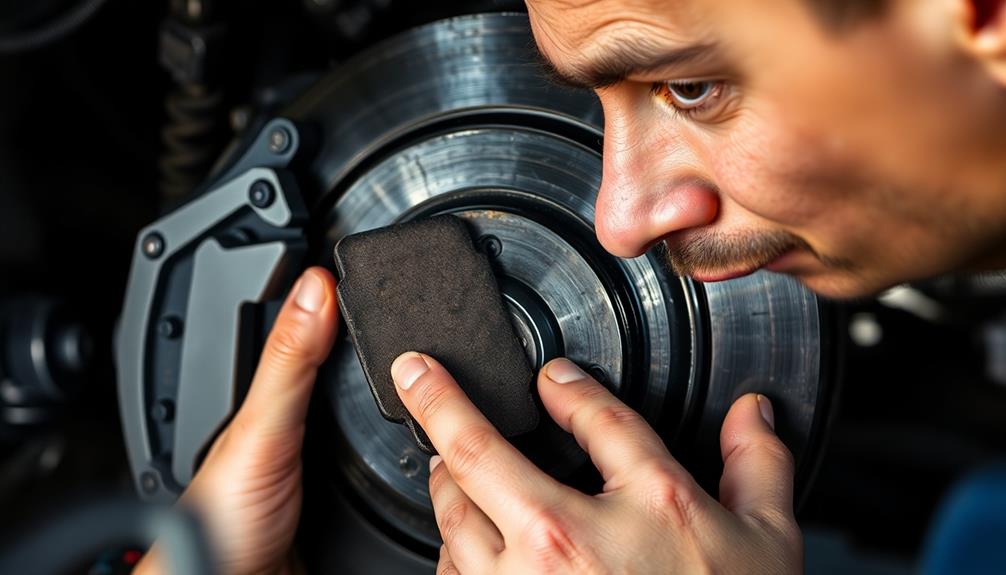
When you're in the market for replacement parts, making informed choices can save you time and money down the line. Here are some tips to help you navigate the selection process:
- Choose OEM components: These are specifically designed for your vehicle, ensuring peak performance and longevity.
- Research aftermarket brands: Not all aftermarket parts are created equal. Some may lead to premature failure or compatibility issues.
- Check warranty options: Reputable manufacturers often provide warranties that cover defects, giving you peace of mind.
Before making a purchase, always verify compatibility with your vehicle's make and model. Consulting your owner's manual or reliable online resources can help you avoid costly mistakes.
Additionally, it's wise to seek recommendations from trusted mechanics or automotive forums. They can point you towards reliable brands and components that have a proven track record in real-world applications.
Frequently Asked Questions
What's the Hardest Part of Being an Auto Mechanic?
The hardest part of being an auto mechanic is juggling multiple repairs while managing customer expectations and stress. You've got to stay updated on technology, work in tough conditions, and maintain trust despite industry challenges.
What Causes a Car to Drive?
Your car drives because the engine generates power through combustion, which the transmission transfers to the wheels. The drivetrain components distribute that power, while steering and suspension systems guarantee you maintain control and stability.
Conclusion
In the end, it's clear: skimping on common car parts can lead to a bumpy ride down the road. Mechanics urge you to choose quality over price, as those cheap alternatives might cost you more in the long run. Investing in high-quality components is like putting on a seatbelt; it keeps you safe and secure. So, the next time you're tempted to cut corners, remember: it's better to spend wisely now than to pay dearly later.
